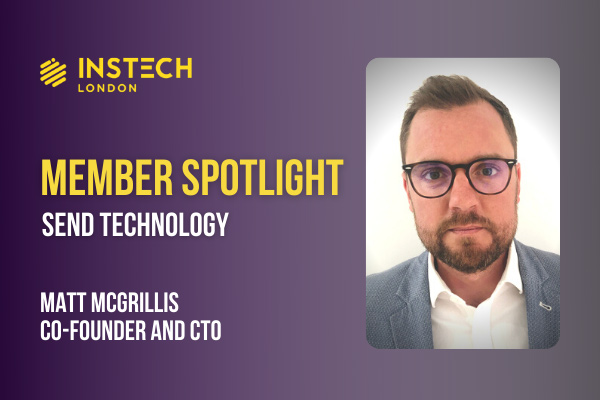InsTech London’s Rebekah Bostan talks to Send Co-founder and CTO Matt McGrillis about the company’s vision for insurers, streamlining data sharing, and the potential of increased automation via AI.
This interview is also available as a PDF download.
As a founder, can you let us know why Send was started?
Send was started in 2017 by three founders. Our backgrounds are in tech within the commercial insurance market, and we had a vision to improve the processes of commercial insurers by combining advanced technology and deep domain expertise.
We knew that cloud technology and AI could play a significant role in helping the market address several challenges. Send started by building an integration platform, Send Connect, between systems commonly used in the market, including traditional systems such as legacy policy admin. We then developed a modular underwriting workbench on top of our integration platform. It’s a cloud-based, AI-assisted platform enriched with business intelligence.
Our first client was a leading global insurer who had initiated a multi-vendor Request for Proposal (RFP) for an extensive transformation project in 2018. From that initial proof of concept, our Send Underwriting Workbench was launched. In 2021 we implemented solutions to MGAs in both the UK and US markets, and next up is a global reinsurer.
Your modular design will likely be attractive to new entrants, but what about incumbents with legacy systems?
The modular nature of our platform and cloud technology allow us to service both types of customers. The structure of the platform supports start-ups that are looking for an agile platform. For mature insurers, the advanced integration tools we use connect all critical systems, including legacy.
Our recent Data Extraction and Ingestion report highlighted how data sharing remains a choke point for the industry. How does your platform aim to streamline data sharing?
Underwriters continue to receive substantial amounts of data in an unstructured way, including emails, spreadsheets and PDFs. It’s chaotic, manual and time-consuming. The effective extraction and ingestion of unstructured or even semi-structured data is a focus area for Send. We believe insurers should receive submissions in a way that suits them. So, we’ve built our platform to enable them to collect data once and seamlessly ingest complex third-party data from multiple sources.
We can deal with all data types, and we don’t impose specific data standards. After we have ingested the data, we are then able to move it into different target systems. As smart technology automates many straight-through processes, it frees up underwriters to spend more time on complex deals that require a skilled human in the loop.
Do you think more use of data standards is the only way to improve the quality of data sharing across the insurance industry?
The insurance industry is always looking to improve standards, which is very important. New or enhanced standards are continuously being announced, and sometimes competing standards are developed. Shared data standards will be key to success, but we are data standard agnostic in our data ingestion, allowing us to remain a flexible partner to all our customers.
Standards aren’t the only way to improve the quality of data sharing. Automation can remove siloes and enhance the quality of data moving through the ecosystem.
Artificial Intelligence (AI) is increasingly being discussed as offering new solutions for commercial insurance. It is the topic of our upcoming report. How do you think the insurance industry will benefit from increased automation via AI?
The benefits are potentially huge. From robotic process automation that takes over mundane, repetitive tasks and AI that rapidly and accurately extracts and harmonises data to deep learning that spots patterns in data to assist with rating and claims, the technology is already here and being used.
For example, we use machine learning for bordereaux processing and to iteratively improve the model. And we use natural language processing to read documents and contracts. Advanced AI helps us make sense of complex, unstructured data and easily harmonise and organise the data. In that sense, we think of AI as an Intelligent Assistant that can learn and improve as it receives and works with more data.
We believe that AI will continue to change the commercial sector in a meaningful way. Underwriters need to make informed decisions in minutes by leveraging gigabytes of data. Advanced platforms are already improving distribution and underwriting, with policies priced, purchased, and bound in near real-time.
In the commercial and specialty industry, we don’t expect AI to replace humans. We see innovations such as AI being used to augment and enhance the skills of the underwriter rather than replace them, especially for more complicated situations where human experience and knowledge is vital.
Why did Send join InsTech London?
Send is in scale-up mode. Ensuring that the insurance community is aware of us and our Connected Workbench platform is vital as we grow. InsTech London has created a great community of like-minded people trying to solve significant problems in the insurance market. Being a member gives us visibility and allows us to contribute to the continued development of the insurance industry.
What kind of companies are you looking to connect with?
We’d love to connect with other product companies to investigate possible partnerships, as well as connect more generally with all market participants.
For more information on Send Technology, go to send.technology


